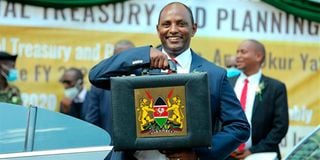Premium
Corporates and citizens must up budget lobbying to address needs

Treasury Secretary Ukur Yatani arrives at Parliament buildings on June 11, 2020 to table Sh3.2 trillion budget.
For many years, the day after the budget would mark a tumultuous period where prices of goods and services would rise and fall depending on the new taxes announced in parliament.
Gone are those days when the Treasury Minister’s briefcase would carry hidden secrets, which would determine policy and prices only known to a few.
The 2010 Constitution has changed this to bring in an all-inclusive budgeting process that is open and transparent. This has brought to an end the backroom lobbying where wheel dealers and rent-seekers would use their access to Treasury Mandarins to shape policy and tax measures.
The process is now open to everyone as much of the budget making is subject to review by Parliament.
From submitting the budget in time to public participation in open forums and inclusion of Wanjiku’s submissions it has been demystified.
Finance Bill
The last victory came in 2019 when the powerful Finance Bill was also opened to scrutiny forcing the Cabinet Secretary to submit to the National Assembly, the money bill which sets out the revenue-raising measures for the National Government, on or before April 30.
The public participation and bringing the Money Bill to Parliament with clear provision that tax measures only comes to effect on the enactment of the Bill has devolved the budgeting process giving corporate and citizens more say than was before.
The question however remains how well this avenue has been utilised to benefit businesses and champion citizens’ interests.
Little, if any lobbying is happening, a tool the corporates need to make use of a lot more and strategically.
In developed markets like the US, lobbying is a huge industry involving around 12,000 registered professionals by 2019 who helped clients spend over $3.5 billion (Sh377 billion).
In fact, civil society organisations, corporates, lawyers and manufacturers have used this tool for ages.
In Kenya so far we have seen stronger lobbying by member organisations like Kenya Association of Manufacturers, Kenya Private Sector Association (Kepsa) and Kenya National Chamber of Commerce and Industry (KNCCI).
This is not enough, businesses need to build lobbying structures and take this as strategic action for the top team.
This presents a need to rethink their External Affairs team as resource and skill set level or outsource this to a capable team. And this not just at the National level but also at County Government level.
Public budget hearings
Ordinary Kenyans should know that once the budget proposals are submitted to Parliament on April 30, they must start to engage the process and participate through public budget hearings, which are held around the country by the Budget and Appropriations Committee in May and June.
They also have the opportunity to make their views on the budget by writing their memoranda to the clerk of the National Assembly and County Assembly respectively with regard to the budget proposals.
The writer is CEO Maudhui House, a communications Consultancy firm





